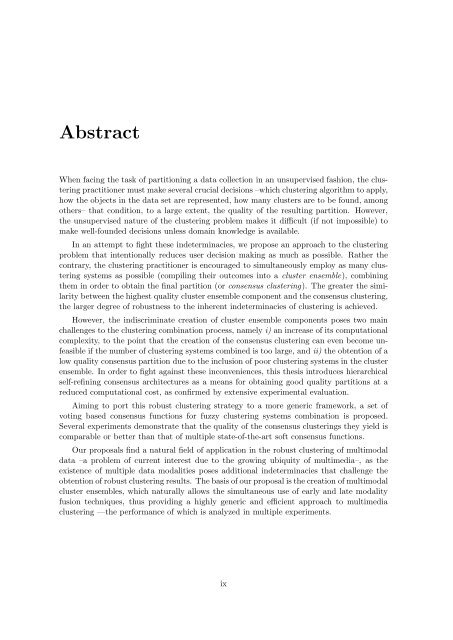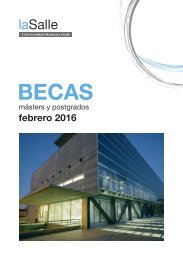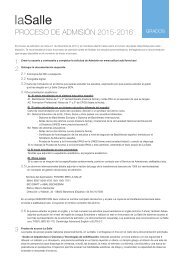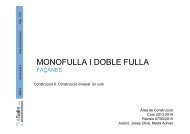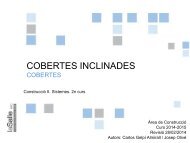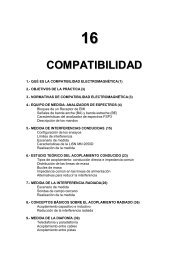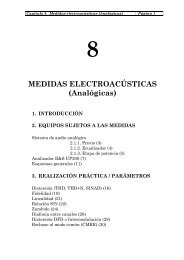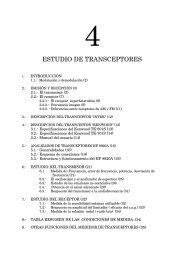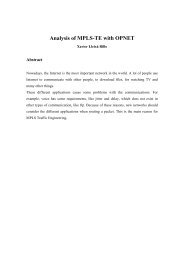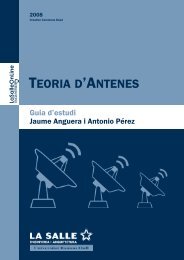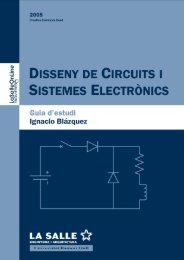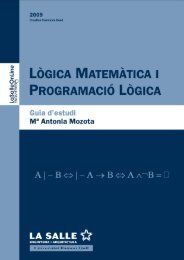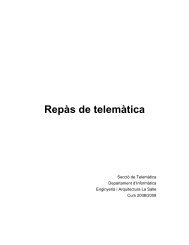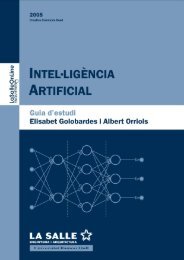- Page 1: C.I.F. G: 59069740 Universitat Ramo
- Page 5: Resum En segmentar de forma no supe
- Page 11 and 12: Contents Resum iii Resumen v Abstra
- Page 13 and 14: Contents 5 Multimedia clustering ba
- Page 15 and 16: Contents C.3.2 Wine data set . . .
- Page 17 and 18: List of Tables 1.1 Illustration of
- Page 19 and 20: List of Tables 4.16 Percentage of e
- Page 21: List of Tables F.1 Significance lev
- Page 24 and 25: List of Figures 3.11 Estimated and
- Page 26 and 27: List of Figures B.11 φ (NMI) histo
- Page 28 and 29: List of Figures C.35 Running times
- Page 30 and 31: List of Figures D.2 φ (NMI) boxplo
- Page 32 and 33: List of Figures E.18 φ (NMI) boxpl
- Page 35 and 36: List of symbols A: set of algorithm
- Page 37 and 38: Chapter 1 Framework of the thesis T
- Page 39 and 40: Chapter 1. Framework of the thesis
- Page 41 and 42: Chapter 1. Framework of the thesis
- Page 43 and 44: Chapter 1. Framework of the thesis
- Page 45 and 46: Chapter 1. Framework of the thesis
- Page 47 and 48: Chapter 1. Framework of the thesis
- Page 49 and 50: Chapter 1. Framework of the thesis
- Page 51 and 52: Chapter 1. Framework of the thesis
- Page 53 and 54: Chapter 1. Framework of the thesis
- Page 55 and 56: Chapter 1. Framework of the thesis
- Page 57 and 58: φ (NMI) 1 0.8 0.6 0.4 0.2 WINE rbr
- Page 59 and 60:
φ (NMI) direct-cos-i2 graph-cos-i2
- Page 61 and 62:
1.5 Motivation and contributions of
- Page 63 and 64:
Chapter 2 Cluster ensembles and con
- Page 65 and 66:
1 1 1 3 3 3 2 2 2 1 2 3 2 2 2 1
- Page 67 and 68:
2.1 Related work on cluster ensembl
- Page 69 and 70:
Chapter 2. Cluster ensembles and co
- Page 71 and 72:
Chapter 2. Cluster ensembles and co
- Page 73 and 74:
Chapter 2. Cluster ensembles and co
- Page 75 and 76:
Chapter 2. Cluster ensembles and co
- Page 77 and 78:
Chapter 2. Cluster ensembles and co
- Page 79 and 80:
Chapter 2. Cluster ensembles and co
- Page 81 and 82:
Chapter 3 Hierarchical consensus ar
- Page 83 and 84:
λ 1 λ 11 λ 12 λ 13 … λ 1m λ
- Page 85 and 86:
Chapter 3. Hierarchical consensus a
- Page 87 and 88:
Chapter 3. Hierarchical consensus a
- Page 89 and 90:
Chapter 3. Hierarchical consensus a
- Page 91 and 92:
Chapter 3. Hierarchical consensus a
- Page 93 and 94:
Chapter 3. Hierarchical consensus a
- Page 95 and 96:
SERT RHCA (sec.) PERT RHCA (sec.) 1
- Page 97 and 98:
SERT RHCA (sec.) PERT RHCA (sec.) 1
- Page 99 and 100:
Chapter 3. Hierarchical consensus a
- Page 101 and 102:
% correct predictions 90 80 70 60 C
- Page 103 and 104:
Consensus Diversity Dataset functio
- Page 105 and 106:
Chapter 3. Hierarchical consensus a
- Page 107 and 108:
λ 1 λ 2 = λ = λ λ3 = λ λ 4 =
- Page 109 and 110:
Chapter 3. Hierarchical consensus a
- Page 111 and 112:
3.3.4 Experiments Chapter 3. Hierar
- Page 113 and 114:
SERT DHCA (sec.) PERT DHCA (sec.) 1
- Page 115 and 116:
SERT DHCA (sec.) PERT DHCA (sec.) 1
- Page 117 and 118:
Chapter 3. Hierarchical consensus a
- Page 119 and 120:
Chapter 3. Hierarchical consensus a
- Page 121 and 122:
Chapter 3. Hierarchical consensus a
- Page 123 and 124:
Consensus Diversity Dataset functio
- Page 125 and 126:
CPU time (sec.) CPU time (sec.) 0.8
- Page 127 and 128:
CPU time (sec.) CPU time (sec.) 3.8
- Page 129 and 130:
CPU time (sec.) CPU time (sec.) 16
- Page 131 and 132:
CPU time (sec.) CPU time (sec.) CPU
- Page 133 and 134:
CPU time (sec.) CPU time (sec.) CPU
- Page 135 and 136:
φ (NMI) 1 0.8 0.6 0.4 0.2 0 CSPA E
- Page 137 and 138:
φ (NMI) 1 0.8 0.6 0.4 0.2 0 CSPA E
- Page 139 and 140:
φ (NMI) φ (NMI) φ (NMI) φ (NMI)
- Page 141 and 142:
Chapter 3. Hierarchical consensus a
- Page 143:
Chapter 3. Hierarchical consensus a
- Page 146 and 147:
4.1. Description of the consensus s
- Page 148 and 149:
4.2. Flat vs. hierarchical self-ref
- Page 150 and 151:
4.2. Flat vs. hierarchical self-ref
- Page 152 and 153:
4.2. Flat vs. hierarchical self-ref
- Page 154 and 155:
4.2. Flat vs. hierarchical self-ref
- Page 156 and 157:
4.2. Flat vs. hierarchical self-ref
- Page 158 and 159:
4.3. Selection-based self-refining
- Page 160 and 161:
4.3. Selection-based self-refining
- Page 162 and 163:
4.3. Selection-based self-refining
- Page 164 and 165:
4.4. Discussion have experimentally
- Page 166 and 167:
4.5. Related publications Year: 200
- Page 169 and 170:
Chapter 5 Multimedia clustering bas
- Page 171 and 172:
Chapter 5. Multimedia clustering ba
- Page 173 and 174:
Chapter 5. Multimedia clustering ba
- Page 175 and 176:
1, 1, 1 2, 1, 1 3 3, 1 1, 1
- Page 177 and 178:
Chapter 5. Multimedia clustering ba
- Page 179 and 180:
φ (NMI) 1 0.8 0.6 0.4 0.2 0 image
- Page 181 and 182:
Chapter 5. Multimedia clustering ba
- Page 183 and 184:
Chapter 5. Multimedia clustering ba
- Page 185 and 186:
Chapter 5. Multimedia clustering ba
- Page 187 and 188:
Chapter 5. Multimedia clustering ba
- Page 189 and 190:
φ (NMI) CSPA agglo−cos−upgma 1
- Page 191 and 192:
φ (NMI) 1 0.8 0.6 0.4 0.2 0 CSPA r
- Page 193 and 194:
Data set IsoLetters CAL500 Internet
- Page 195 and 196:
Data set IsoLetters CAL500 Internet
- Page 197 and 198:
Chapter 5. Multimedia clustering ba
- Page 199 and 200:
Chapter 6 Voting based consensus fu
- Page 201 and 202:
Chapter 6. Voting based consensus f
- Page 203 and 204:
Chapter 6. Voting based consensus f
- Page 205 and 206:
⎛ OΛ = ΛT ⎜ Λ = ⎜ ⎝ ⎛
- Page 207 and 208:
Chapter 6. Voting based consensus f
- Page 209 and 210:
Chapter 6. Voting based consensus f
- Page 211 and 212:
Chapter 6. Voting based consensus f
- Page 213 and 214:
Chapter 6. Voting based consensus f
- Page 215 and 216:
Chapter 6. Voting based consensus f
- Page 217 and 218:
Positional voting Chapter 6. Voting
- Page 219 and 220:
Chapter 6. Voting based consensus f
- Page 221 and 222:
Chapter 6. Voting based consensus f
- Page 223 and 224:
Chapter 6. Voting based consensus f
- Page 225 and 226:
Chapter 6. Voting based consensus f
- Page 227:
Chapter 6. Voting based consensus f
- Page 230 and 231:
Chapter 7. Conclusions ing upon the
- Page 232 and 233:
7.1. Hierarchical consensus archite
- Page 234 and 235:
7.3. Multimedia clustering based on
- Page 236 and 237:
7.4. Voting based soft consensus fu
- Page 238 and 239:
References References Agogino, A. a
- Page 240 and 241:
References Carpenter, G., S. Grossb
- Page 242 and 243:
References Fayyad, U. 1996. Data mi
- Page 244 and 245:
References Halkidi, M., Y. Batistak
- Page 246 and 247:
References Karypis, G., E. Han, and
- Page 248 and 249:
References Miyajima, K. and A. Rale
- Page 250 and 251:
References Snoek, C.G.M., M. Worrin
- Page 252 and 253:
References Xu, R. and D. Wunsch II.
- Page 254 and 255:
A.1. The CLUTO clustering package f
- Page 256 and 257:
A.2. Data sets Strategy Similarity
- Page 258 and 259:
A.2. Data sets Data set Number of N
- Page 260 and 261:
A.3. Data representations Data set
- Page 262 and 263:
A.3. Data representations assumptio
- Page 264 and 265:
A.4. Cluster ensembles Data set nam
- Page 266 and 267:
A.6. Computational resources hierar
- Page 269 and 270:
Appendix B Experiments on clusterin
- Page 271 and 272:
Appendix B. Experiments on clusteri
- Page 273 and 274:
B.1.5 Ionosphere data set Appendix
- Page 275 and 276:
clustering count clustering count 1
- Page 277 and 278:
B.1.13 Summary Appendix B. Experime
- Page 279 and 280:
Appendix B. Experiments on clusteri
- Page 281 and 282:
clustering count clustering count c
- Page 283 and 284:
clustering count clustering count c
- Page 285 and 286:
Appendix C Experiments on hierarchi
- Page 287 and 288:
l =7 l =8 l =9 Appendix C. Experime
- Page 289 and 290:
Appendix C. Experiments on hierarch
- Page 291 and 292:
PERT RHCA (sec.) PERT RHCA (sec.) P
- Page 293 and 294:
SERT RHCA (sec.) SERT RHCA (sec.) S
- Page 295 and 296:
SERT RHCA (sec.) SERT RHCA (sec.) S
- Page 297 and 298:
Appendix C. Experiments on hierarch
- Page 299 and 300:
PERT RHCA (sec.) PERT RHCA (sec.) P
- Page 301 and 302:
PERT RHCA (sec.) PERT RHCA (sec.) P
- Page 303 and 304:
SERT RHCA (sec.) SERT RHCA (sec.) S
- Page 305 and 306:
SERT RHCA (sec.) SERT RHCA (sec.) S
- Page 307 and 308:
Appendix C. Experiments on hierarch
- Page 309 and 310:
Appendix C. Experiments on hierarch
- Page 311 and 312:
PERT DHCA (sec.) PERT DHCA (sec.) P
- Page 313 and 314:
PERT DHCA (sec.) PERT DHCA (sec.) P
- Page 315 and 316:
SERT DHCA (sec.) SERT DHCA (sec.) S
- Page 317 and 318:
SERT DHCA (sec.) SERT DHCA (sec.) S
- Page 319 and 320:
Appendix C. Experiments on hierarch
- Page 321 and 322:
PERT DHCA (sec.) PERT DHCA (sec.) P
- Page 323 and 324:
PERT DHCA (sec.) PERT DHCA (sec.) P
- Page 325 and 326:
PERT DHCA (sec.) PERT DHCA (sec.) P
- Page 327 and 328:
Appendix C. Experiments on hierarch
- Page 329 and 330:
CPU time (sec.) CPU time (sec.) CPU
- Page 331 and 332:
Appendix C. Experiments on hierarch
- Page 333 and 334:
CPU time (sec.) CPU time (sec.) CPU
- Page 335 and 336:
CPU time (sec.) CPU time (sec.) CPU
- Page 337 and 338:
Consensus quality comparison Append
- Page 339 and 340:
CPU time (sec.) CPU time (sec.) CPU
- Page 341 and 342:
φ (NMI) φ (NMI) φ (NMI) φ (NMI)
- Page 343 and 344:
CPU time (sec.) CPU time (sec.) CPU
- Page 345 and 346:
φ (NMI) φ (NMI) φ (NMI) φ (NMI)
- Page 347 and 348:
CPU time (sec.) CPU time (sec.) CPU
- Page 349 and 350:
φ (NMI) φ (NMI) φ (NMI) φ (NMI)
- Page 351 and 352:
CPU time (sec.) CPU time (sec.) CPU
- Page 353 and 354:
φ (NMI) φ (NMI) φ (NMI) φ (NMI)
- Page 355 and 356:
CPU time (sec.) CPU time (sec.) CPU
- Page 357 and 358:
φ (NMI) φ (NMI) φ (NMI) φ (NMI)
- Page 359 and 360:
CPU time (sec.) CPU time (sec.) CPU
- Page 361 and 362:
φ (NMI) φ (NMI) φ (NMI) φ (NMI)
- Page 363 and 364:
CPU time (sec.) CPU time (sec.) CPU
- Page 365 and 366:
Appendix C. Experiments on hierarch
- Page 367 and 368:
CPU time (sec.) CPU time (sec.) CPU
- Page 369 and 370:
Appendix D Experiments on self-refi
- Page 371 and 372:
φ (NMI) φ (NMI) φ (NMI) φ (NMI)
- Page 373 and 374:
Appendix D. Experiments on self-ref
- Page 375 and 376:
φ (NMI) φ (NMI) φ (NMI) φ (NMI)
- Page 377 and 378:
φ (NMI) φ (NMI) φ (NMI) φ (NMI)
- Page 379 and 380:
φ (NMI) φ (NMI) φ (NMI) φ (NMI)
- Page 381 and 382:
φ (NMI) φ (NMI) φ (NMI) φ (NMI)
- Page 383 and 384:
φ (NMI) φ (NMI) φ (NMI) φ (NMI)
- Page 385 and 386:
φ (NMI) 1 0.5 0 E λref λ c 2 λ
- Page 387 and 388:
φ (NMI) 1 0.5 0 E λref λ c 2 λ
- Page 389 and 390:
φ (NMI) 1 0.5 0 E λref λ c 2 λ
- Page 391 and 392:
φ (NMI) 1 0.5 0 E λref λ c 2 λ
- Page 393 and 394:
φ (NMI) 1 0.5 0 E λref λ c 2 λ
- Page 395 and 396:
Appendix E Experiments on multimoda
- Page 397 and 398:
φ (NMI) 1 0.8 0.6 0.4 0.2 0 audio
- Page 399 and 400:
φ (NMI) 1 0.8 0.6 0.4 0.2 0 CSPA d
- Page 401 and 402:
φ (NMI) 1 0.8 0.6 0.4 0.2 0 object
- Page 403 and 404:
φ (NMI) CSPA agglo−cos−upgma 1
- Page 405 and 406:
φ (NMI) 1 0.8 0.6 0.4 0.2 0 text
- Page 407 and 408:
φ (NMI) 1 0.8 0.6 0.4 0.2 0 CSPA d
- Page 409 and 410:
Appendix F Experiments on soft cons
- Page 411 and 412:
Appendix F. Experiments on soft con
- Page 413 and 414:
Appendix F. Experiments on soft con
- Page 415 and 416:
φ (NMI) 1 0.8 0.6 0.4 0.2 Appendix
- Page 417 and 418:
Appendix F. Experiments on soft con
- Page 419 and 420:
φ (NMI) 1 0.8 0.6 0.4 0.2 0 10 0 A
- Page 421 and 422:
solutions). F.11 PenDigits data set
- Page 423:
C.I.F. G: 59069740 Universitat Ramo


